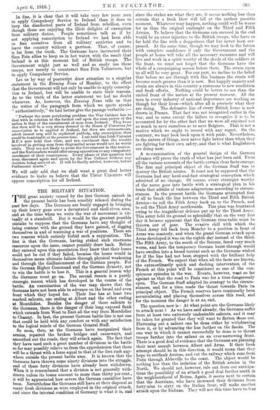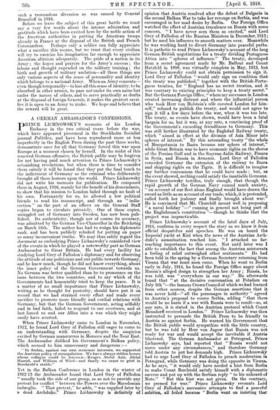THE MILITARY SITUATION.
r HE great anxiety caused by the first German onrush in Jl. the present battle has been sensibly relaxed, during the past few days. The Germans are busily engaged in bringing up their heavy guns over a devastated and shell-riven area, and at the time when we write the war of movement is vir- tually at a standstill. But it would be the greatest possible mistake to suppose that the Germans have any thought of being content with the ground they have gained, of digging themselves in and of resuming a war of positions. There are two reasons which entirely forbid such a supposition. The first is that the Germans, having staked such enormous resources upon the issue, cannot possibly draw back. Before they entered upon this speculation they knew that their losses eould not be cut if they failed, because the losses would in themselves mean ultimate failure through physical weakening and through the disillusionment of the German people. For the German Higher Command and the German dynasty, not to win the battle is to lose it. This is a general reason why the Germans must go on. The second reason is a purely strategic reason which has developed in the course of the battle. An examination of the war map shows that the Germans have not been able to advance on the broad and even front which they hoped for. Their line has at least two marked salients, one ending at Albert and the other ending at Mentdidier. Besides the danger of these salients to the Germans, there is the danger of their long exposed flank which extends from West to East all the way from Montdidier to Chauny. In fact, the present German battle-line is not one that e,ould be held with any comfort or with any satisfaction to the logical minds of the German General Staff. So soon, then, as the Germans have reorganized their armies, repaired the broken bridges and causeways, and smoothed out the roads, they will attack again. The fact that they have used such a great number of divisions in the battle so far may possibly relieve us from the apprehension that there will be a thrust with a force equal to that of the first rush any- where outside the present battle area. It is known that the Germans have thrown some ninety divisions into the struggle, and of these forty divisions have already been withdrawn. When it is remembered that a division is not generally with- drawn unless unless its losses amount to more than thirty per cent., it will be appreciated how severe the German casualties have been. Nevertheless the Germans still have at their disposal as many fresh divisions as were employed in the original attack, and since the internal condition of Germany is what it is, and since the stakes are what they are, it seems nothing less than certain that a fresh blow will fall at the earliest possible moment. Whatever may happen, nothing could well be worse for us than the original onslaught on the Third and Fifth Armies. To believe that the Germans can succeed in the end would be an utter injustice to the British troops, who have so far held the line with a doggedness that has never been sur- passed. At the same time, though we may look to the future with complete confidence if only the Government and the people at home will take all the necessary measures and will live and work in a spirit worthy of the deeds of the soldiers at the front, we must not forget that the Germans have the whole of a campaigning season before them. The strain upon us all will be very great. For our part, we incline to the belief that before we are through with this business the strain will become much greater than it is now. But happily anxiety and strain are always in this country a summons to new resolution and fresh efforts. Nothing could be better to see than the united front of the nation at the present moment. All the men in every industry of national importance are working as though for their lives—which after all is precisely what they are doing. The defensive line of every British home is now drawn in France. That fact was not recognized earlier in the war, and to some extent the failure to recognize it is to be accounted for by the other fact that we were all enjoined not so much to save ourselves as to save Belgium. That is not a motive which we ought to record with any regret. On the contrary, we may look back upon it with pride. Nevertheless, in the nature of things, men never fight better than when they are fighting for their own safety, and that is what Englishmen are doing now.
A re-examination of the general design of the German advance will prove the truth of what has just been said. From all the various accounts of the battle certain clear facts emerge. The first and principal object of the German Staff was to destroy the British armies. It must not be supposed that the Germans had any hard-and-fast strategical conception which admitted of no change. Of course, every strategist worthy of the name goes into battle with a strategical plan in his brain that admits of various adaptations according to circum- stances. In the present battle the Germane attempted first of all to break the line between the Third and Fifth British Armies—to roll the Fifth Army back on to the French, and to roll the Third Army northwards. This plan was frustrated owing to the magnificent defence put up by the Third Army. This army held its .ground so splendidly that on the very first day it became apparent that the German time-table must be thrown out of gear. The evasive skill with which the Third Army fell back from Moiachy to a position in front of Arras was masterly, and when the grand German attack upon Arras developed it was on the eighth day instead of the third. The Fifth Army, to the south of the Somme, fared very much worse, and here the temporary German burst-through would have swollen into a broad torrent such as the Germans wished for if the line had not been stopped with the brilliant help of the French. We expect that when all the facts are known, the extraordinarily quick and dashing intervention of the French at this point will be considered as one of the con- spicuous episodes in the war. Events, however, went so far against us that the road to Paris was for a time dangerously open. The German Staff adapted its strategy to the circum- stances, and for a time made the thrust towards Paris its principal object. The French reserves have continually been accumulating and. placing themselves across this road, and for the moment the danger is at an end.
The question now Is: At what point are the Germans likely to attack next I As we have said already, the Germans suffer from at least two extremely, undesirable salients, and it may be taken for granted that they will want to flatten these out. Flattening out a salient can be done either by withdrawing from it, or by advancing the line further on the flanks. The one way in which it cannot successfully be done is to thrust troops further into the salient on an ever-narrowing front. There is a good deal of evidence that the Germans are planning their next assault between Albert and Arras. If their fresh attempt should be in this direction, it would mean that they hope to outflank Amiens, and cut the railway which runs from Paris through Abbeville to the coast. The object would be nothing less than the isolation of the British armies in the North. We should not, however, rule out from our anticipa- tions the possibility of an attack a good deal further south in the neighbourhood of Reims. Again, it seems next to certain that the Austrians, who have increased their divisions from forty-nine to sixty on the Italian front, will make another attack upon the Italians. They will not this time have to fear such a tremendous diversion as was caused by General Brussiloff in 1916. Before we leave the subject of this great battle we must say a very few words about the intense admiration and. gratitude which have been excited here by the noble action of the American authorities in putting the American troops already in France at the disposal of the British and. French Commanders. Perhaps only a soldier can fully appreciate what a sacrifice this means, but we trust that every civilian will try to exercise his imagination far enough to appreciate American altruism adequately. The pride of a nation in its Army ; the hopes and prayers for the Army's success ; the labour and thought expended on the military training ; the birth and growth of military ambition—all these things are only various aspects of the sense of personality and identity which belongs to a national Army. When an Army consents— even though temporarily—to lose all this sense of identity, to be absorbed in other armies, to pass not under its own name but under the names of others, and to serve practically as drafts at the disposal of foreign Generals, it makes the greatest sacri- fice it is open to an Army to make. We hope and believe that the reward will be great.



























 Previous page
Previous page